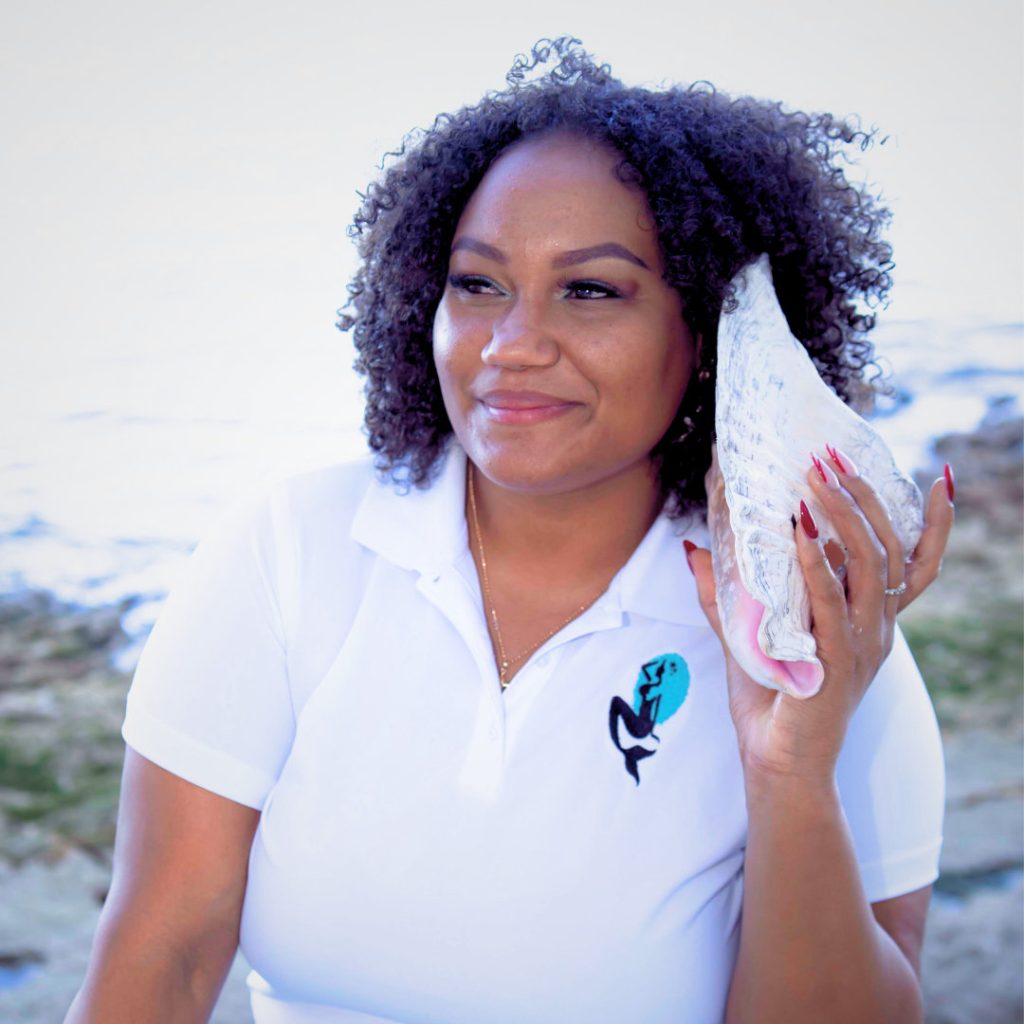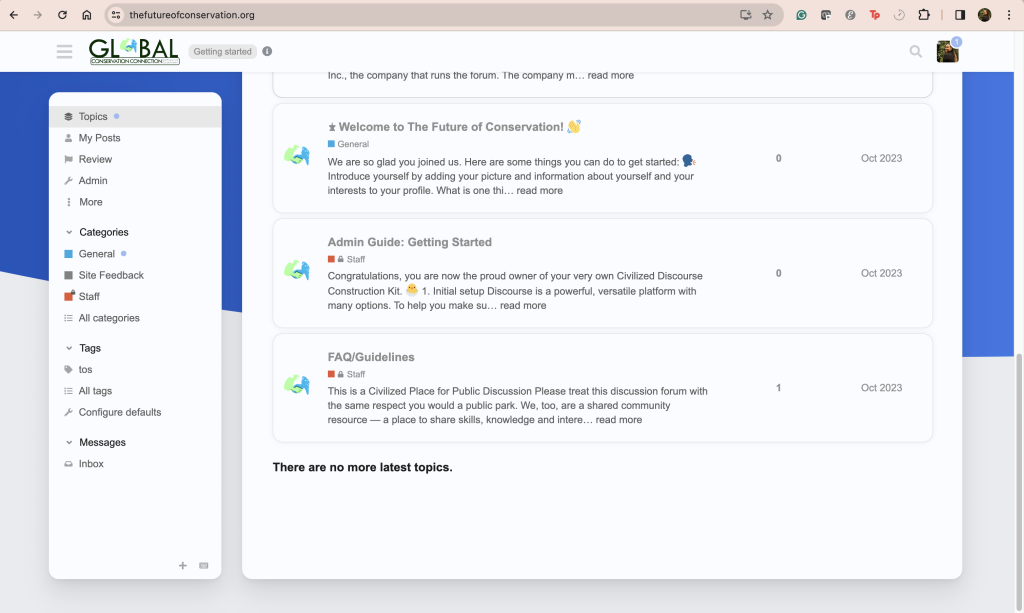The idea for a community of practice (CoP) stemmed from the Future of Conservation NGOs project, where there was a recognised need to provide a space for safe and continued discussions about the need and pathways for transformative change within the conservation sector. This recognition led to the selection of Lashanti Jupp for her innovative approach to connecting people in The Bahamas through the Bahamas Conservation Connection (BCC).
The Bahamas Conservation Connection was an initiative led by Lashanti with the aim to bridge gaps between conservationists, NGOs, the public and businesses in the Bahamas.
Lashanti was commissioned to scale the Bahamas Conservation Connection globally and was supported through a specially curated incubation and co-learning programme to turn her idea into action. Lashanti is now set to launch "Global Conservation Connect" (GCC), a virtual community of practice, on April 22, World Earth Day.
In this interview, Lashanti shares her journey, passion for conservation and vision for the future.
My idea for Global Conservation Connect (GCC) is to be this bustling virtual space for ideas and collaboration, where people from all walks of life – be they passionate conservationists, dedicated researchers, seasoned professionals or curious students – gather from every corner of the globe.
A place where geographical boundaries disappear. Individuals, organisations and experts unite, transcending limitations to exchange knowledge, share best practices and form collaborations that know no borders. I aim for it to be a melting pot of perspectives and experiences, where the common goal of safeguarding our environment unites us all.
My journey in conservation began with a deeply rooted passion for protecting the natural wonders of my local environment. Witnessing the challenges faced by ecosystems and wildlife in my backyard ignited a desire to make a difference.
However, it wasn't until I attended my MPhil in Conservation Leadership at Cambridge University that I realised these struggles were not unique to my country. Conservationists worldwide grappled with similar issues – habitat loss, species decline and the looming threat of climate change.

This realisation of shared challenges expanded my vision from local to global. Inspired by the parallels I saw, I was driven to create a platform where the collective wisdom of conservationists worldwide could converge. My time at Cambridge was truly eye-opening, as I met individuals from diverse backgrounds who were all asking the same question: Why aren't we collaborating more globally?
This experience fueled my mission to replicate the Cambridge Conservation Initiative in The Bahamas, leading to the creation of the Bahamas Conservation Connection. Through the BCC and now through GCC (the new community of practice being launched this month), I aim to inspire collaboration and collective action to address the most pressing conservation challenges we face on a global scale.
I think it's time for transformative change in the conservation sector. Too often, our efforts are focused on addressing symptoms rather than tackling root causes. We need to shift the narrative and dig deeper to understand the underlying drivers of environmental degradation. This, for me, means challenging outdated perspectives and embracing new, holistic approaches that consider the interconnectedness of social, economic and environmental factors. I envision a conservation sector that prioritises systemic change over short-term fixes.
I strongly believe that collaboration across sectors and disciplines is key. Through the GCC I aim to create a safe space for healthy discourse around topics that demand attention, no matter how taboo or controversial they may be. Global Conservation Connect will foster an environment of mutual respect and understanding and empower participants to navigate difficult issues respectfully. Through these courageous dialogues, we aim to not only broaden our collective understanding but also pave the way for innovative solutions that address the root causes of environmental degradation and find workable solutions
Planetary health is at the forefront of my agenda for change within GCC. It is a concept that recognises the intricate interconnectedness between the health of the Earth's natural systems and the wellbeing of all life forms, including humans. Planetary health acknowledges that our actions as stewards of the planet directly impact our health and that of future generations. It emphasises the importance of preserving biodiversity, mitigating climate change, protecting natural resources and promoting sustainable development practices to safeguard the health of the planet and its inhabitants. By prioritising planetary health within the GCC, we aim to galvanise collective action and foster collaborations that address the complex challenges facing our planet. Through education, advocacy and innovative solutions, we aspire to create a world where the health of ecosystems and the health of humanity are intrinsically linked, paving the way for a more resilient and sustainable future for all.

I'm really passionate about ensuring that inclusivity and diversity are truly embedded in everything we do. My approach is to build a team that shares this passion and commitment. I look for team members who not only have the right skills and expertise but who also genuinely care about fostering an inclusive and diverse environment within GCC.
Together, we're working on implementing initiatives that promote diversity, equity and inclusion at every level of our community. It's about creating a space where everyone feels valued, respected and empowered to contribute their unique perspectives and talents.
In addition, we will be actively addressing critical issues ranging from inequality, unsustainable consumption patterns and profit-driven practices that contribute to deforestation and habitat destruction. As the community manager of Global Conservation Connect, I will ensure these topics are central to our discussions and deliberations.
Measuring the success of a community like Global Conservation Connect can be multifaceted, as it involves assessing various aspects of its impact and effectiveness.
One key metric will be engagement within the community. We will look at the number of active members, the frequency of interactions such as posts and comments, and participation in events and initiatives. This will help us gauge the vitality and relevance of the community. We will also track the nature and topics of discussions. The variety and quality of these discussions can indicate the level of engagement and the breadth of interests within the community. Gathering feedback and assessing the satisfaction of our community members will also be key components of measuring our success.
Unearthodox's support has been crucial in shaping GCC. The guidance and advice I’ve received over the months helped us refine our vision, strategies and plans. The initial financial backing also provided us with the much-needed resources to fuel our idea into a tangible output.
One leadership lesson I've learned is that while going fast may allow you to progress alone, to truly go far, you must bring others along with you.
One unexpected thing I learned was that 1pm ET is the best time to have an international call.
We aspire to foster a dynamic and thriving community dedicated to driving positive change in the field of conservation and environmental sustainability.
Currently, our primary focus will be on securing organisational memberships and partnerships to ensure the sustainability of the community both financially as well as in terms of members/participants.
We plan to establish quarterly webinar panels featuring keynote speakers addressing some key themes and challenges related to biodiversity conservation, climate change, etc. These webinars will serve as a platform for insightful discussions and knowledge sharing. To maintain momentum between webinars, we plan to establish forums to enable continuous engagement among members. We aim to reach a point where members nominate themselves to facilitate and drive these discussions, with technical support provided by a community manager.
We are actively looking for innovators, changemakers and practitioners who are passionate about shaping the future of conservation. I’d like to invite you to join the community and become part of what we hope will nudge us towards a global movement for change.
As a member, you'll have access to a vibrant community of practising conservationists, researchers, professionals and students from around the world, all driven by a shared vision for a regenerative future. Global Conservation Connect will provide the much-needed platform for collaboration, knowledge sharing and networking, allowing us to connect with each other, exchange ideas and explore innovative solutions to the pressing environmental challenges.
To join the community click: https://thefutureofconservation.org/.
Lashanti Jupp is a marine conservationist, science communicator, project and grants manager born and raised in The Bahamas. Passionate about connecting people to the environment, she has over a decade of experience in environmental outreach, with a deep understanding of stakeholder engagement and consultation. Her work across several islands in The Bahamas has provided her with insights into unique subcultures and hierarchies in different communities.
Lashanti specialises in gathering information through conversation and behavioural observation, as well as relationship building and engagement. She holds an MPhil in Conservation Leadership from the University of Cambridge, UK, a BSc in Marine Biology from Barry University, FL, USA, and a certificate in Social Psychology from The University of Queensland, Australia.
To follow Lashanti’s professional journey, you can connect with her on Linkedin.